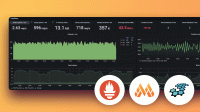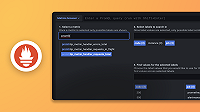Caution
Grafana Alloy is the new name for our distribution of the OTel collector. Grafana Agent has been deprecated and is in Long-Term Support (LTS) through October 31, 2025. Grafana Agent will reach an End-of-Life (EOL) on November 1, 2025. Read more about why we recommend migrating to Grafana Alloy.
loki.source.kubernetes_events
loki.source.kubernetes_events tails events from the Kubernetes API and
converts them into log lines to forward to other loki components.
Multiple loki.source.kubernetes_events components can be specified by giving them
different labels.
Usage
loki.source.kubernetes_events "LABEL" {
forward_to = RECEIVER_LIST
}Arguments
The component starts a new reader for each of the given targets and fans out
log entries to the list of receivers passed in forward_to.
loki.source.kubernetes_events supports the following arguments:
| Name | Type | Description | Default | Required |
|---|---|---|---|---|
job_name | string | Value to use for job label for generated logs. | "loki.source.kubernetes_events" | no |
log_format | string | Format of the log. | "logfmt" | no |
namespaces | list(string) | Namespaces to watch for Events in. | [] | no |
forward_to | list(LogsReceiver) | List of receivers to send log entries to. | yes |
By default, loki.source.kubernetes_events will watch for events in all
namespaces. A list of explicit namespaces to watch can be provided in the
namespaces argument.
By default, the generated log lines will be in the logfmt format. Use the
log_format argument to change it to json. These formats are also names of
LogQL parsers, which can be used for processing the logs.
NOTE: When watching all namespaces, Grafana Agent Flow must have permissions to watch events at the cluster scope (such as using a ClusterRoleBinding). If an explicit list of namespaces is provided, Grafana Agent Flow only needs permissions to watch events for those namespaces.
Log lines generated by loki.source.kubernetes_events have the following
labels:
namespace: Namespace of the Kubernetes object involved in the event.job: Value specified by thejob_nameargument.instance: Value matching the component ID.
If job_name argument is the empty string, the component will fail to load. To
remove the job label, forward the output of loki.source.kubernetes_events to
a loki.relabel component.
For compatibility with the eventhandler integration from static mode,
job_name can be set to "integrations/kubernetes/eventhandler".
Blocks
The following blocks are supported inside the definition of
loki.source.kubernetes_events:
| Hierarchy | Block | Description | Required |
|---|---|---|---|
| client | client | Configures Kubernetes client used to tail logs. | no |
| client > basic_auth | basic_auth | Configure basic_auth for authenticating to the endpoint. | no |
| client > authorization | authorization | Configure generic authorization to the endpoint. | no |
| client > oauth2 | oauth2 | Configure OAuth2 for authenticating to the endpoint. | no |
| client > oauth2 > tls_config | tls_config | Configure TLS settings for connecting to the endpoint. | no |
| client > tls_config | tls_config | Configure TLS settings for connecting to the endpoint. | no |
The > symbol indicates deeper levels of nesting. For example, client > basic_auth refers to a basic_auth block defined
inside a client block.
client block
The client block configures the Kubernetes client used to tail logs from
containers. If the client block isn’t provided, the default in-cluster
configuration with the service account of the running Grafana Agent pod is
used.
The following arguments are supported:
| Name | Type | Description | Default | Required |
|---|---|---|---|---|
api_server | string | URL of the Kubernetes API server. | no | |
kubeconfig_file | string | Path of the kubeconfig file to use for connecting to Kubernetes. | no | |
bearer_token_file | string | File containing a bearer token to authenticate with. | no | |
bearer_token | secret | Bearer token to authenticate with. | no | |
enable_http2 | bool | Whether HTTP2 is supported for requests. | true | no |
follow_redirects | bool | Whether redirects returned by the server should be followed. | true | no |
proxy_url | string | HTTP proxy to send requests through. | no | |
no_proxy | string | Comma-separated list of IP addresses, CIDR notations, and domain names to exclude from proxying. | no | |
proxy_from_environment | bool | Use the proxy URL indicated by environment variables. | false | no |
proxy_connect_header | map(list(secret)) | Specifies headers to send to proxies during CONNECT requests. | no |
At most, one of the following can be provided:
no_proxy can contain IPs, CIDR notations, and domain names. IP and domain
names can contain port numbers. proxy_url must be configured if no_proxy
is configured.
proxy_from_environment uses the environment variables HTTP_PROXY, HTTPS_PROXY
and NO_PROXY (or the lowercase versions thereof). Requests use the proxy from
the environment variable matching their scheme, unless excluded by NO_PROXY.
proxy_url and no_proxy must not be configured if proxy_from_environment
is configured.
proxy_connect_header should only be configured if proxy_url or proxy_from_environment are configured.
basic_auth block
| Name | Type | Description | Default | Required |
|---|---|---|---|---|
password_file | string | File containing the basic auth password. | no | |
password | secret | Basic auth password. | no | |
username | string | Basic auth username. | no |
password and password_file are mutually exclusive, and only one can be provided inside a basic_auth block.
authorization block
| Name | Type | Description | Default | Required |
|---|---|---|---|---|
credentials_file | string | File containing the secret value. | no | |
credentials | secret | Secret value. | no | |
type | string | Authorization type, for example, “Bearer”. | no |
credential and credentials_file are mutually exclusive, and only one can be provided inside an authorization block.
oauth2 block
| Name | Type | Description | Default | Required |
|---|---|---|---|---|
client_id | string | OAuth2 client ID. | no | |
client_secret_file | string | File containing the OAuth2 client secret. | no | |
client_secret | secret | OAuth2 client secret. | no | |
endpoint_params | map(string) | Optional parameters to append to the token URL. | no | |
proxy_url | string | HTTP proxy to send requests through. | no | |
no_proxy | string | Comma-separated list of IP addresses, CIDR notations, and domain names to exclude from proxying. | no | |
proxy_from_environment | bool | Use the proxy URL indicated by environment variables. | false | no |
proxy_connect_header | map(list(secret)) | Specifies headers to send to proxies during CONNECT requests. | no | |
scopes | list(string) | List of scopes to authenticate with. | no | |
token_url | string | URL to fetch the token from. | no |
client_secret and client_secret_file are mutually exclusive, and only one can be provided inside an oauth2 block.
The oauth2 block may also contain a separate tls_config sub-block.
no_proxy can contain IPs, CIDR notations, and domain names. IP and domain
names can contain port numbers. proxy_url must be configured if no_proxy
is configured.
proxy_from_environment uses the environment variables HTTP_PROXY, HTTPS_PROXY
and NO_PROXY (or the lowercase versions thereof). Requests use the proxy from
the environment variable matching their scheme, unless excluded by NO_PROXY.
proxy_url and no_proxy must not be configured if proxy_from_environment
is configured.
proxy_connect_header should only be configured if proxy_url or proxy_from_environment are configured.
tls_config block
| Name | Type | Description | Default | Required |
|---|---|---|---|---|
ca_pem | string | CA PEM-encoded text to validate the server with. | no | |
ca_file | string | CA certificate to validate the server with. | no | |
cert_pem | string | Certificate PEM-encoded text for client authentication. | no | |
cert_file | string | Certificate file for client authentication. | no | |
insecure_skip_verify | bool | Disables validation of the server certificate. | no | |
key_file | string | Key file for client authentication. | no | |
key_pem | secret | Key PEM-encoded text for client authentication. | no | |
min_version | string | Minimum acceptable TLS version. | no | |
server_name | string | ServerName extension to indicate the name of the server. | no |
The following pairs of arguments are mutually exclusive and can’t both be set simultaneously:
ca_pemandca_filecert_pemandcert_filekey_pemandkey_file
When configuring client authentication, both the client certificate (using
cert_pem or cert_file) and the client key (using key_pem or key_file)
must be provided.
When min_version is not provided, the minimum acceptable TLS version is
inherited from Go’s default minimum version, TLS 1.2. If min_version is
provided, it must be set to one of the following strings:
"TLS10"(TLS 1.0)"TLS11"(TLS 1.1)"TLS12"(TLS 1.2)"TLS13"(TLS 1.3)
Exported fields
loki.source.kubernetes_events does not export any fields.
Component health
loki.source.kubernetes_events is only reported as unhealthy if given an invalid
configuration.
Debug information
loki.source.kubernetes_events exposes the most recently read timestamp for
events in each watched namespace.
Debug metrics
loki.source.kubernetes_events does not expose any component-specific debug metrics.
Component behavior
The component uses its data path, a directory named after the domain’s
fully qualified name, to store its positions file. The positions file is used
to store read offsets, so that if a component or Grafana Agent restarts,
loki.source.kubernetes_events can pick up tailing from the same spot.
The data path is inside the directory configured by the --storage.path command line argument.
In the Static mode’s eventhandler integration, a cache_path argument is used to configure a positions file.
In Flow mode, this argument is no longer necessary.
Example
This example collects watches events in the kube-system namespace and
forwards them to a loki.write component so they are written to Loki.
loki.source.kubernetes_events "example" {
// Only watch for events in the kube-system namespace.
namespaces = ["kube-system"]
forward_to = [loki.write.local.receiver]
}
loki.write "local" {
endpoint {
url = env("LOKI_URL")
}
}Compatible components
loki.source.kubernetes_events can accept arguments from the following components:
- Components that export Loki
LogsReceiver
Note
Connecting some components may not be sensible or components may require further configuration to make the connection work correctly. Refer to the linked documentation for more details.



